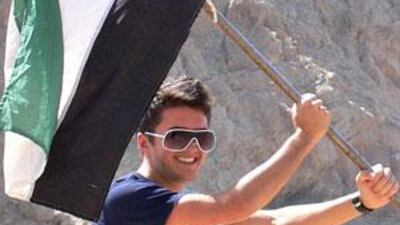RAS AL KHAIMAH // When Blake Skjellerup skates on to the ice at the Winter Olympic Games tomorrow, he will be carrying the hopes of more than four million New Zealanders. But to the people of Ras al Khaimah, he is also representing them. It may seem unusual for someone who races on ice to call the desert home. The 24-year-old short-track speed skater came to the emirate as a teenager to visit his mother and stepfather, who taught at RAK Women's College.
He fell in love with the desert and its community, and would pack up his skates at the end of each season in New Zealand and return to the sunshine and friendships he found in RAK. After almost five years in the UAE, his family returned to New Zealand two months ago. But in RAK, Skjellerup remains a local hero. He has trained in the dunes of Liwa and traversed the craggy cliffs of the Hajar mountains. Skjellerup says his regime of running and swimming in the desert sun is a respite from the rigours of his workouts on ice.
During the rest of the year, he has a stricter schedule. He skates six hours a day, "six and a half days a week" at the Calgary Olympic Oval, built for the 1988 Games, the last time they were hosted by Canada. Skjellerup trains three hours each, morning and night four hours on the ice and two hours off. Such dedication earned him the title of Junior Maori Sportsman of the Year in 2004 and New Zealand Speed Skater of the Year in 2003, 2004 and 2007. He boasts the New Zealand records at 500m, 1,000m and 1,500m, events in which he is competing in Vancouver.
Yet it all began by accident. When Skjellerup was 10, he wanted to be an All Black. "I broke my arm and I couldn't play rugby anymore and had to do a sport in winter," he said. "My brother was a skater and he said, 'You don't really need your arms for that'. So I tried it and I liked it. It stuck. "It was so different and not many other people did it. That was one of the reasons why I liked it. "It really hit me when I was about 12 and I first saw the Winter Olympics. I had no idea that it was an Olympic sport before and I was like, 'Wow, I want to go there'. That was the dream all along."
Skjellerup first represented New Zealand when he was 13, at the Tasman Cup in Australia. But it was not until he travelled to Korea for the Junior World Championships at 16 that he got his first real taste of international competition. "It was a big shock. I'd only been competing against Australians and it was just a completely different world," he said. "It got me excited about the level of skating I could reach. I didn't have much of an idea beforehand."
Speed skating is a relatively young sport in New Zealand and better access to ice time and coaching resources drew Skjellerup overseas. He has competed in countries as far-flung as China, Hungary and South Africa, and trained in South Korea and now Canada. "Every year since I was 16 I trained somewhere over the New Zealand summer," he said. In South Korea in 2007, Skjellerup was 22 and the self-proclaimed "old guy".
"They trained me extremely hard and you don't want to quit because there's a lot of younger kids behind you," he said. "Everybody's my competition. When I'm racing I don't really see a country, I don't see a person, I just see an object I have to get around, and fast. "It's exhilarating. In long track, it's you against the clock. In short track, it's you against other people - anything can happen."
Skjellerup moved to Calgary 18 months ago to join four other skaters from small countries who faced similar problems with limited ice time and resources. They are trained by Jeroen Otter, a Dutch coach working for Belgium. The move to Calgary has worked wonders. "My performance has improved tenfold. My times have gone down a huge amount. I've been in five top 16 finishes. Before that I was struggling to be in the top 25."
Skjellerup finished 15th in the 1,000m and 25th in the 500m at the International Skating Union World Cup in November, giving New Zealand an Olympic spot. Skaters do not qualify as individuals so he had to wait until January 27 for confirmation that he had been chosen to represent New Zealand. He is racing in the 500m, 1,000m and 1,500m events. They begin tomorrow with the 1,500m, 5am on Sunday UAE time.
About a quarter of Skjellerup's training budget is funded by the New Zealand Sports Academy. For the rest, he has relied on fund-raising events, family and friends. Whatever his performance at the Olympics, Skjellerup is already a champion in RAK, respected for his good company and humour. At its karaoke joint, he belts out Supertramp songs with an energy that could only belong to a world-class athlete. His fans across the globe have posted a video on YouTube to show their support.
At the Olympic Village in Vancouver, where he is living with 15 other New Zealand athletes for the next two weeks, he said: "I can't even imagine what it's going to be like in front of 15,000 people. It's amazing here right now. "I'm looking out the window, and the building beside us is covered in the Stars and Stripes and the building next to them is Sweden and also beside us is Italy. "We have New Zealand ferns all over our balcony."
The future was open, Skjellerup said. "It's the Olympics and then I'll go from there." But, he added, he was looking forward to a chicken shawarma from al Farrouj when he returned to RAK. azacharias@thenational.ae

